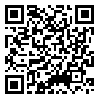BibTeX | RIS | EndNote | Medlars | ProCite | Reference Manager | RefWorks
Send citation to:
URL: http://journal.zums.ac.ir/article-1-2195-en.html
2- School of Nursing and Midwifery, Zanjan University of Medical Sciences, Zanjan, Iran ,
3- Medical School, Zanjan University of Medical Sciences, Zanjan, Iran
Background and Objective: Movement restriction is one of the most important considerations in nursing care following percutaneous coronary intervention (PCI). After this procedure, in order to prevent from potential vessel complications, such as hemorrhage and hematoma in femoral site, patients should have complete bed rest without flexion in hip joint for at least 8 hours. This immobility for extended period of time may lead to back pain. The aim of this study was to determine the effect of aromatherapy massage on back pain of patients undergoing PCI. Materials and Methods: A pre-test/post-test design with one control group was used in this semi- experimental study. 76 patients under elective PCI who had the inclusion criteria of the study were selected by simple method sampling and were randomly divided into two control and experimental groups. After PCI, the patients in the control group received the conventional care of the ward including 8 hours of movement restriction. In contrast, patients in the experimental group, after bearing 8 hours of movement restriction received massage with aromatherapy solution composed of peppermint, celery and lavender essence in sweet almond oil )%1 concentration(. The back pain severity was measured by visual analog scale (VAS) in three levels (before intervention, immediately after intervention and 2 hours after intervention). The hemorrhage both in pre and post interventions and hematoma 24 hours after intervention were assessed and recorded by applying observation technique. Results: Severity in back pain significantly decreased in the experimental group immediately after receiving aromatherapy massage in comparison to the control group (P< 0.0005). This effect lasted as long as 2 hours after the intervention (P< 0.0005). In the experimental group, back pain mean changes were meaningful immediately after the intervention and prior to it (P< 0.0005) however, the changes were not significant in the control group (P> 0.0005). No evidence of hemorrhage or hematoma was seen in the patients. Also, 92.1% of the experimental group expressed their overall satisfaction with the intervention. Conclusion: The results showed that aromatherapy massage is a safe and effective method in diminishing back pain of patients undergoing PCI.
Received: 2013/06/20 | Accepted: 2013/06/29 | Published: 2013/06/29
| Rights and permissions | |
 |
This work is licensed under a Creative Commons Attribution-NonCommercial 4.0 International License. |




